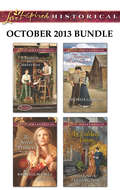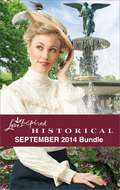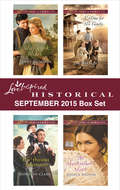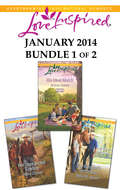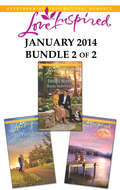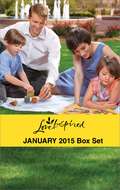- Table View
- List View
Love Inspired Historical November 2017 Box Set: A Lawman for Christmas\Mail-Order Christmas Baby\Their Mistletoe Matchmakers\A Child's Christmas Wish
by Karen Kirst Sherri Shackelford Keli Gwyn Erica VetschLove Inspired Historical brings you four new titles! Enjoy these historical romances of adventure and faith.A LAWMAN FOR CHRISTMASSmoky Mountain Matchesby Karen KirstAfter lawman Ben MacGregor and avowed spinster Isabel Flores discover a four-year-old boy abandoned on her property at Christmas, they must work together to care for him. But can their temporary arrangement turn into a forever family? MAIL-ORDER CHRISTMAS BABYMontana Courtshipsby Sherri ShackelfordWhen a child arrives with the Wells Fargo delivery with documents listing Heather O’Connor and Sterling Blackwell as the baby’s parents, they are forced to marry to give the baby a home—and save their reputations.THEIR MISTLETOE MATCHMAKERSby Keli GwynLavinia Crowne heads to California planning to bring her late sister’s orphaned children back east. But Henry Hawthorn, their paternal uncle, is intent on raising them in the only home they know…and three little matchmakers hope their mistletoe-filled schemes will bring their aunt and uncle together.A CHILD’S CHRISTMAS WISHby Erica VetschAfter her home is destroyed in a fire, pregnant widow Kate Amaker and her in-laws take refuge with Oscar Rabb—the widowed farmer next door whose daughter has one holiday wish: a baby sibling for Christmas.Join HarlequinMyRewards.com to earn FREE books and more. Earn points for all your Harlequin purchases from wherever you shop.
Love Inspired Historical October 2013 Bundle
by Winnie Griggs Rachelle Mccalla Shannon Farrington Rhonda GibsonLove Inspired Historical brings you four new titles for one great price, available now for a limited time only from October 1 to October 31! Travel back in time and experience powerful and engaging stories of romance, adventure and faith. This Love Inspired Historical bundle includes A Family for Christmas by Winnie Griggs, The Secret Princess by Rachelle McCalla, Taming the Texas Rancher by Rhonda Gibson and An Unlikely Union by Shannon Farrington.Look for 4 new inspiring historical stories every month from Love Inspired Historical!
Love Inspired Historical October 2013 Bundle
by Winnie Griggs Rachelle Mccalla Shannon Farrington Rhonda GibsonLove Inspired Historical brings you four new titles for one great price, available now for a limited time only from October 1 to October 31! Travel back in time and experience powerful and engaging stories of romance, adventure and faith. This Love Inspired Historical bundle includes A Family for Christmas by Winnie Griggs, The Secret Princess by Rachelle McCalla, Taming the Texas Rancher by Rhonda Gibson and An Unlikely Union by Shannon Farrington.Look for 4 new inspiring historical stories every month from Love Inspired Historical!
Love Inspired Historical October 2014 Box Set
by Linda Ford Christine Johnson Karen Kirst Lily GeorgeLove Inspired Historical October 2014 Box Set
Love Inspired Historical October 2014 Box Set
by Linda Ford Christine Johnson Karen Kirst Lily GeorgeLove Inspired Historical brings you four new titles for one great price, available now! This Love Inspired Historical bundle includes Big Sky Cowboy by Linda Ford, Married by Christmas by Karen Kirst, Suitor by Design by Christine Johnson and The Nanny Arrangement by Lily George. Look for four new inspirational suspense stories every month from Love Inspired Historical!
Love Inspired Historical October 2015 Box Set
by Linda Ford Lacy Williams Jo Ann BrownLove Inspired Historical brings you four new titles at a great value, available now! Enjoy these historical romances of adventure and faith. A DADDY FOR CHRISTMAS Christmas in Eden Valley by Linda FordChivalry demands cowboy Blue Lyons help any woman in need, so he offers widow Clara Weston--and her daughters--shelter and food when they have nowhere to go. And whether he wants it or not, Clara and her daughters are soon chipping away at his guarded heart.A WESTERN CHRISTMAS by Renee Ryan & Louise M. Gouge In two brand-new novellas, Christmas comes to the West and brings with it the chance for love, both old and new.HER COWBOY DEPUTY Wyoming Legacyby Lacy WilliamsInjured and far from home, sheriff's deputy Matt White finds love in the most unexpected of places with a former childhood friend. FAMILY IN THE MAKING Matchmaking Babies Arthur, Lord Trelawney, needs lessons in caring for children, so he decides to practice with the rescued orphans sheltering at his family estate. A practical idea…until he meets their lovely nurse, Maris Oliver.
Love Inspired Historical October 2017 Box Set: Montana Bride by Christmas\Cowboy Lawman's Christmas Reunion\Mistletoe Mommy\A Mistaken Match
by Linda Ford Louise M. Gouge Danica Favorite Whitney BaileyLove Inspired Historical brings you four new titles! Enjoy these historical romances of adventure and faith.MONTANA BRIDE BY CHRISTMASBig Sky Countryby Linda FordWhen Annie Marshall answers single father Hugh Arness’s ad for a marriage in name only, the preacher refuses—she’s too young and pretty to be happy in a loveless union. But after he agrees to Annie’s suggestion of a four-week trial period, Hugh might just realize they’re the perfect match.COWBOY LAWMAN’S CHRISTMAS REUNIONFour Stones Ranchby Louise M. GougeAfter fleeing from her late husband’s cousin, who hopes to extort money from her and take her children away, Evangeline Benoit relocates to Colorado at Christmas. But will local sheriff Justice Gareau—the man whose heart she once broke—help her?MISTLETOE MOMMYby Danica FavoriteUnable to afford a nanny, widowed single father Luke Jeffries seeks a wife to care for his children. But even as a secret from mail-order bride Nellie McClain’s past puts their future together in jeopardy, can Luke and Nellie find true love in their marriage of convenience?A MISTAKEN MATCHby Whitney BaileyWhen his mail-order bride arrives, James McCann believes there’s been a mistake—Ann Cromwell is beautiful, despite his request for a plain bride. As they wait for the matchmaking agency’s mix-up to be fixed, Ann struggles to prove she can be a good farmer’s wife after all.Join HarlequinMyRewards.com to earn FREE books and more. Earn points for all your Harlequin purchases from wherever you shop.
Love Inspired Historical September 2014 Bundle
by Laura Abbot Janet Lee Barton Renee Ryan Louise M. GougeLove Inspired Historical brings you four new titles for one great price, available now! This Love Inspired Historical bundle includes His Most Suitable Bride by Renee Ryan, Cowboy to the Rescue by Louise M. Gouge, The Gift of a Child by Laura Abbot and A Home for Her Heart by Janet Lee Barton. Look for four new inspirational suspense stories every month from Love Inspired Historical!
Love Inspired Historical September 2015 Box Set
by Penny Richards Dorothy Clark Jessica Nelson Jan DrexlerLove Inspired Historical brings you four new titles at a great value, available now! Enjoy these historical romances of adventure and faith. WOLF CREEK WIDOWby Penny RichardsStill healing from emotional--and physical--wounds left by her late husband, widow Meg Thomerson turns to Ace Allen for help running her business. Promising to remain at her side while she recovers, can he also mend her bruised heart? HIS PRECIOUS INHERITANCEby Dorothy ClarkNewspaper editor Charles Thornberg is an expert at running a business, not raising a toddler. He desperately needs reporter Clarice Gordon's help caring for his little brother...and learning how to become a father--and husband. A HOME FOR HIS FAMILYby Jan DrexlerCowboy Nate Colby journeys west for a fresh start with his orphaned nieces and nephew. Maybe fellow newcomer and beautiful schoolmarm Sarah MacFarland will be the missing piece to their fractured family... THE MATCHMAKER'S MATCHby Jessica NelsonLady Amelia Baxley is known for finding perfect love matches--for everyone except for herself. She agrees to help Lord Spencer Broyhill find a wife...but can she follow through after she begins falling for the reformed rake?
Love Inspired Historical September 2017 Box Set: Mail-Order Marriage Promise\Pony Express Special Delivery\Rancher to the Rescue\The Outlaw's Second Chance
by Barbara Phinney Regina Scott Rhonda Gibson Angie DickenLove Inspired Historical brings you four new titles! Enjoy these historical romances of adventure and faith.MAIL-ORDER MARRIAGE PROMISEFrontier Bachelorsby Regina ScottWhen John Wallin’s sister orders him a mail-order bride without his knowledge, can the bachelor find a way to move on from his past rejection and fulfill the marriage promise to lovely Dottie Tyrrell, who comes with a baby—and a secret?PONY EXPRESS SPECIAL DELIVERYSaddles and Spursby Rhonda GibsonMaggie Fillmore’s late husband had one final wish—that their unborn son would inherit their ranch. But when a greedy relative threatens to take the ranch, there’s only one way Maggie can keep it: a marriage of convenience to the new Pony Express manager, Clayton Young.RANCHER TO THE RESCUEby Barbara PhinneyWith their parents missing, Clare Walsh and her siblings could lose everything, including each other—unless she accepts rancher Noah Livingstone’s proposal. And though they plan a union in name only, will Clare and Noah risk their hearts for a chance at a true-love connection?THE OUTLAW’S SECOND CHANCEby Angie DickenWhen Aubrey Huxley and Cort Stanton try to claim the same land in the Oklahoma Land Rush, they strike a deal: she can have the land for her horse ranch if he can work for her. But will she let him stay on when she learns he’s a wanted man?Join HarlequinMyRewards.com to earn FREE books and more. Earn points for all your Harlequin purchases from wherever you shop.
Love Inspired January 2014 - Bundle 1 of 2
by Arlene James Debra Clopton Betsy St. AmantLove Inspired brings you three new titles for one great price, available now! Enjoy these uplifting contemporary romances of faith, forgiveness and hope. This Love Inspired bundle includes Her Unexpected Cowboy by Debra Clopton, His Ideal Match by Arlene James and The Rancher's Secret Son by Betsy St. Amant.Look for 6 new inspirational stories every month from Love Inspired!
Love Inspired January 2014 - Bundle 2 of 2
by Gail Gaymer Martin Lenora Worth Jenna MindelLove Inspired brings you three new titles for one great price, available now! Enjoy these uplifting contemporary romances of faith, forgiveness and hope. This Love Inspired bundle includes Bayou Sweetheart by Lenora Worth, The Firefighter's New Family by Gail Gaymer Martin and Season of Redemption by Jenna Mindel.Look for 6 new inspirational stories every month from Love Inspired!
Love Inspired January 2015 - Box Set
by Merrillee Whren Lisa Jordan Belle Calhoune Patricia JohnsLove Inspired brings you four new titles for one great price, available now! Enjoy these uplifting contemporary romances of faith, forgiveness and hope.SECOND CHANCE REUNIONVillage of HopeMerrillee WhrenAfter a troubled past, Annie Payton is on the road to recovery. Now she must convince her ex-husband she's worthy of his forgiveness--and a second chance at love.LAKESIDE REDEMPTIONLisa JordanZoe James returns home to Shelby Lake for a fresh start--not romance. So when she starts to fall for ex-cop Caleb Sullivan, will she have the courage to accept a second chance at happily-ever-after?HEART OF A SOLDIERBelle CalhouneSoldier Dylan Hart can't wait to surprise pen-pal Holly Lynch in her hometown. But when he discovers that sweet Holly has kept a big secret from him, can their budding romance survive?THE RANCHER'S CITY GIRLPatricia JohnsCory Stone's determined to build a relationship with his estranged father, but when he invites the ill man to join him at his ranch, Cory never expects to find love with his dad's nurse.
Love Inspired January 2016 - Box Set 1 of 2
by Carolyne Aarsen Tina Radcliffe Ruth Logan HerneLove Inspired brings you three new titles at a great value, available now! Enjoy these uplifting contemporary romances of faith, forgiveness and hope. A FAMILY FOR THE SOLDIERLone Star Cowboy Leagueby Carolyne Aarsen Returning to his family ranch, injured army vet Grady Stillwater is unprepared for the surprises waiting for him--including his growing feelings for his physical therapist. Can he get past Chloe Miner's secrets and welcome a ready-made family? AN UNEXPECTED GROOMGrace Havenby Ruth Logan HerneFor Kimberly Gallagher, planning a senator's daughter's wedding isn't easy--especially when their security team includes her teenage crush, Drew Slade. Can she move past old hurts to realize the future she's been searching for is standing right beside her? ROCKY MOUNTAIN REUNIONby Tina Radcliffe Contractor Matt Clark is focused on his business--and raising his newly found daughter. When he discovers his latest project will destroy the home of his ex-wife, he'll have to choose between saving his company and a happily-ever-after with his first love.
Love Inspired January 2016 - Box Set 2 of 2
by Mia Ross Teri Wilson Jo Ann BrownLove Inspired brings you three new titles at a great value, available now! Enjoy these uplifting contemporary romances of faith, forgiveness and hope. AMISH HOMECOMING Amish Hearts by Jo Ann Brown Desperate for help in raising her niece, Leah Beiler goes back to her Amish roots in Paradise Springs, Pennsylvania--and the boy-next-door who she's never forgotten. Could this be their second chance at forever? HER SMALL-TOWN COWBOY Oaks Crossing by Mia Ross When teacher Lily St. George teams up with cowboy Mike Kinley to give horse-riding lessons to the local children, her small-town life goes from simple to extraordinary as she falls for the handsome single dad and his daughter. ALASKAN SANCTUARY by Teri Wilson Eager to make her wolf sanctuary a success, Piper Quinn fights every obstacle--even Ethan Hale, the journalist who deems the animals dangerous. Sparks fly, but soon their battle will be to win each other's hearts.
Love Inspired January 2022 - Box Set 1 of 2: An Uplifting Inspirational Romance
by Marta Perry Deb Kastner Jill WeatherholtThey have almost everything in common… except the thing that could keep them apart. Much to her Amish mother's exasperation, Bay Stutzman isn't looking for a husband. That is, until a buggy accident on a stormy night leads to meeting handsome greenhouse owner David Jansen—who might just be Bay's perfect match. The only problem? David is a Mennonite. Now Bay is torn between her life among the Amish…and the man she can't envision a life without.From Love Inspired: Uplifting stories of faith, forgiveness and hope.
Love Inspired January 2022 - Box Set 2 of 2: An Uplifting Inspirational Romance
by Lisa Jordan Patricia Johns Jill KemererTo give her nephew a home, she&’ll need one man&’s help… When Anke Bachman agrees to care for her Englisch nephew despite disapproval from her community, moving in to a derelict old house is her only option. With newcomer Josiah Mast&’s help, she might just be able to make the place livable. But Josiah&’s past has him wary of any hint of scandal. As their feelings blossom, can Josiah and Anke find acceptance in the community…and a future together?From Love Inspired: Uplifting stories of faith, forgiveness and hope.The Amish of New Hope Book 1: Hiding Her Amish SecretBook 2: An Unexpected Amish HarvestBook 3: Caring for Her Amish Family
Love Inspired January 2023 Box Set - 1 of 2: An Uplifting Inspirational Romance
by Allie Pleiter Lisa Carter Jocelyn McClayComing soon! Love Inspired January 2023 Box Set - 1 of 2 by Jocelyn McClay\Allie Pleiter\Lisa Carter will be available Dec 27, 2022.
Love Inspired January 2023 Box Set 2 of 2: An Uplifting Inspirational Romance
by Lorraine Beatty Gabrielle Meyer Patrice LewisComing soon! Love Inspired January 2023 Box Set 2 of 2 by Patrice Lewis\Gabrielle Meyer\Lorraine Beatty will be available Dec 27, 2022.
Love Inspired January 2024 Box Set - 1 of 2
by Jenna Mindel Lorraine Beatty Patricia JohnsLove Inspired brings you three new titles! Enjoy these uplifting contemporary romances of faith, forgiveness and hope. This box set includes: AN AMISH MOTHER FOR HIS CHILD (An Amish Country Matches novel)by Patricia JohnsAfter giving up on romance, Verna Kauffman thought a marriage of convenience would give her everything she&’s longed for—a family. But marrying reserved Adam Lantz comes with a list of rules Verna wasn&’t expecting. Can they overcome their differences to discover that all they really need is each other?FINDING THEIR WAY BACK (A K-9 Companions novel)by Jenna MindelTwenty-eight years ago, Erica Laine and Ben Fisher were engaged to be married…until Erica broke his heart. Now, as they work together on a home that Erica needs to fulfill her new role as a traveling nurse, their past connection is rekindled. But can love take root when Erica is committed to leaving again?THE GUARDIAN AGREEMENTby Lorraine BeattyWhen jilted bride Olivia Marshall is forced to work with her ex-fiancé, Ben Kincaid, it stirs up old pain. Yet she finds herself asking Ben for help when her four-year-old nephew is abandoned on her doorstep. Will their truce lead to a second chance…or will Ben&’s past stand in their way?For more stories filled with love and faith, look for Love Inspired January 2024 Box Set – 2 of 2
Love Inspired January 2024 Box Set - 2 of 2
by Allie Pleiter Jocelyn McClay Nicole LamLove Inspired brings you three new titles! Enjoy these uplifting contemporary romances of faith, forgiveness and hope. This box set includes: HER SCANDALOUS AMISH SECRETby Jocelyn McClayA life-changing event propels Lydia Troyer to return to her Amish community to repair her damaged reputation—with a baby in tow. And when she finds old love Jonah Lapp working on her family home, she knows winning back his trust will be hardest of all…especially once she reveals her secret.FOR THE SAKE OF HER SONS (A True North Springs novel)by Allie PleiterFollowing a tragedy, Willa Scottson doesn&’t hold much hope for healing while at Camp True North Springs. But swim instructor Bruce Lawrence is determined to help the grieving widow and her twin boys. This is his chance to make amends—if Willa will let him once the truth comes out…SAVING THE SINGLE DAD&’S BOOKSTOREby Nicole LamInheriting his grandfather&’s bookstore forces Dominic Tang to return to his hometown faced with a big decision—keep it or sell. But manager Gianna Marchesi insists she can prove the business&’s worth. Then an accident leads to expensive damages, making Dominic choose between risking everything or following his heart…For more stories filled with love and faith, look for Love Inspired January 2024 Box Set – 1 of 2
Love Inspired January 2025 Box Set - 1 of 2
by Jo Ann Brown Louise M. Gouge Jolene NavarroLove Inspired brings you three new titles! Enjoy these uplifting contemporary romances of faith, forgiveness and hope.This box set includes: HEALING HER AMISH HEART (An Amish of Lost River novel)by Jo Ann BrownSchoolteacher Mollie Lehman loves her job, but there&’s one problem—her family&’s medical debt means she can&’t afford to take school breaks off. The arrival of widower Noah Frye might just be the answer she&’s looking for. Working as a nanny for his two children is the ideal solution…until Mollie and Noah start to fall for each other. But they&’ve both lost too much to trust in love. Will they find the courage to face their fears and realize their perfect arrangement could also be a perfect match?A FAITHFUL GUARDIAN (A K-9 Companions tale)by Louise M. GougeAfter her teen daughter, Zoey, bonds with a stray dog, the last thing Lauren Parker anticipates is the owner accusing her of stealing it. The prominent rancher and widowed father, Robert Mattson, doesn&’t believe Lauren&’s innocence, but even he can see the special understanding his dog, Lady, has for Zoey&’s medical needs. When Robert&’s twins become fast friends with Zoey, his prickly interactions with Lauren soon give way to something more. As Lady brings them all closer together, Robert can&’t harden his heart any longer…but is he too late to win Lauren&’s love?THE TEXAN&’S JOURNEY HOME (A Lone Star Heritage romance)by Jolene NavarroWorking as a ranch hand isn&’t Reno Espinoza&’s dream job, but it lets him keep his lifelong secret hidden. Until an accident on the ranch leads him to unintentionally reveal his learning disability to his childhood crush, Lyrissa Martinez. Teaching Reno to read is no trouble for the special ed teacher, but his carefree attitude reminds her of a past she&’s trying to move on from. As the two spend more time together, can they help each other heal old wounds for a chance at forever?For more stories filled with love and faith, look for Love Inspired January 2025 Box Set – 2 of 2
Love Inspired January 2025 Box Set - 2 of 2
by Linda Goodnight Laurel Blount Donna GartshoreLove Inspired brings you three new titles! Enjoy these uplifting contemporary romances of faith, forgiveness and hope.This box set includes: THE AMISH WIDOWER&’S SURPRISE (A Hickory Springs Amish novel)by Laurel BlountAll widower Eben Miller wants is someone to help him run his general store, but every Amish woman who applies is more interested in marriage than employment. Falling in love again feels impossible for Eben, who needs a worker, not a wife. Straight-talking Lilah Troyer is different. The spinster gave up on finding a husband a long time ago and is desperate for an income to remain independent. She&’s even willing to forget Eben&’s humiliating rejection of her back in their youth. It&’s the perfect solution, until romance comes knocking on their door…REDEEMING THE PAST (A House of Hope novel)by New York Times bestselling author Linda GoodnightTo make amends for his misspent youth, bodyguard John-Parker Wisdom vows to turn his late foster mom&’s property into a home for neglected teenage boys. Only there&’s a catch—unexpected co-heir Zoey Chavez. The pretty widow needs the house proceeds to support her children, and she won&’t let a former bad boy stand in her way. Now they have three months to agree on a plan or forfeit their shared inheritance. But when John-Parker&’s past complicates things as the deadline looms near, will they risk everything for a chance at a forever partnership?THE COURAGE TO LOVEby Donna GartshoreAfter months of saving up, Claire Casey&’s dreams of expanding her flower shop and providing for her four-year-old daughter are finally in reach. Except her rival on the town council, Pastor Sam Meyer, has plans to buy the same property Claire&’s eyeing. When a mutual friend requests their help for a wedding, Sam and Claire form a reluctant business partnership—until they discover common ground, and something deeper blossoms. But Claire has trust issues from her previous relationship, and Sam is hiding a secret he fears will change how Claire sees him…For more stories filled with love and faith, look for Love Inspired January 2025 Box Set – 1 of 2
Love Inspired July 2013 - Bundle 1 of 2
by Arlene James Jean C. Gordon Rebecca KertzLove Inspired brings you three new titles for one great price, available now for a limited time only from July 1 to July 31! Enjoy these uplifting contemporary romances of faith, forgiveness and hope. This Love Inspired bundle includes Love In Bloom by Arlene James, Noah's Sweetheart by Rebecca Kertz, and Small-Town Mom by Jean C. Gordon.Look for six new inspirational stories every month from Love Inspired!
Love Inspired July 2013 - Bundle 2 of 2
by Charlotte Carter Linda Goodnight Patricia JohnsLove Inspired brings you three new titles for one great price, available now for a limited time only from July 1 to July 31! Enjoy these uplifting contemporary romances of faith, forgiveness and hope. This Love Inspired bundle includes Baby in His Arms by Linda Goodnight, Montana Wrangler by Charlotte Carter, and His Unexpected Family by Patricia Johns.Look for six new inspirational stories every month from Love Inspired!

